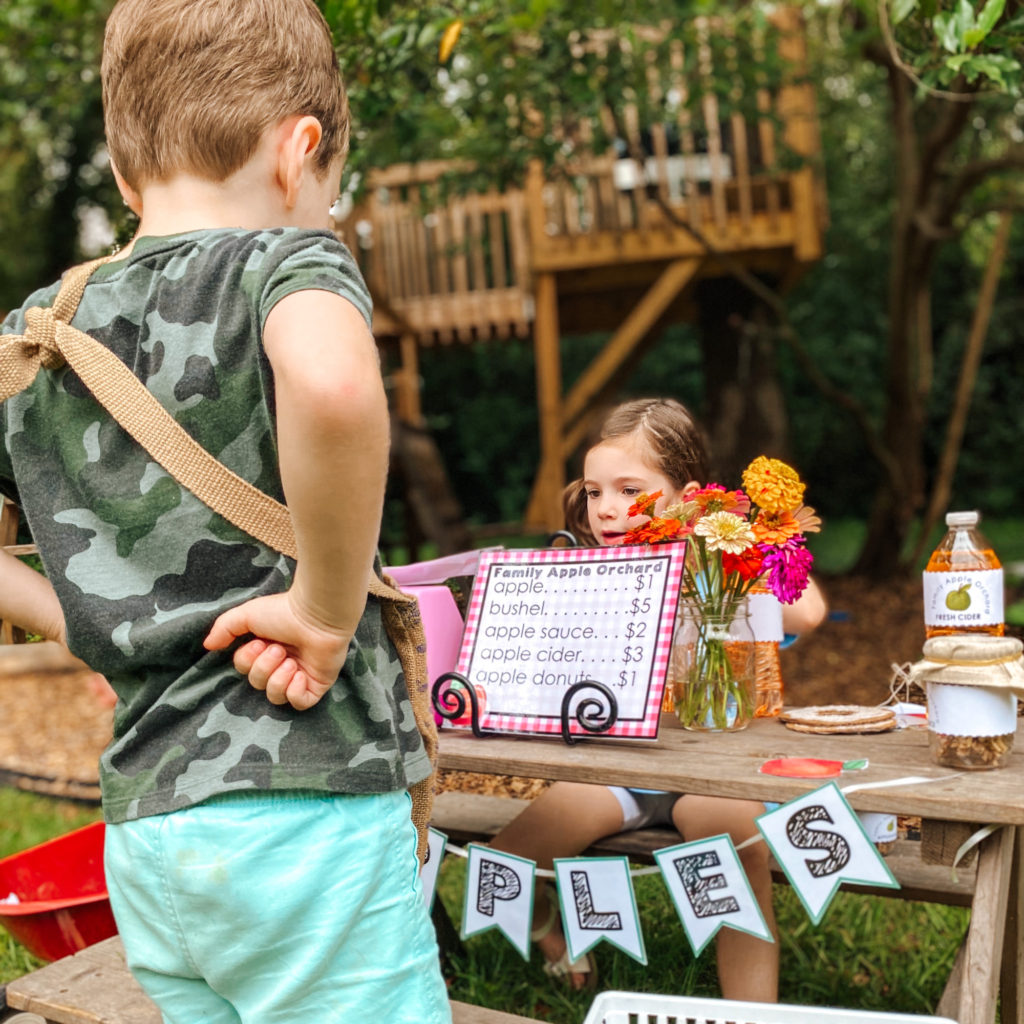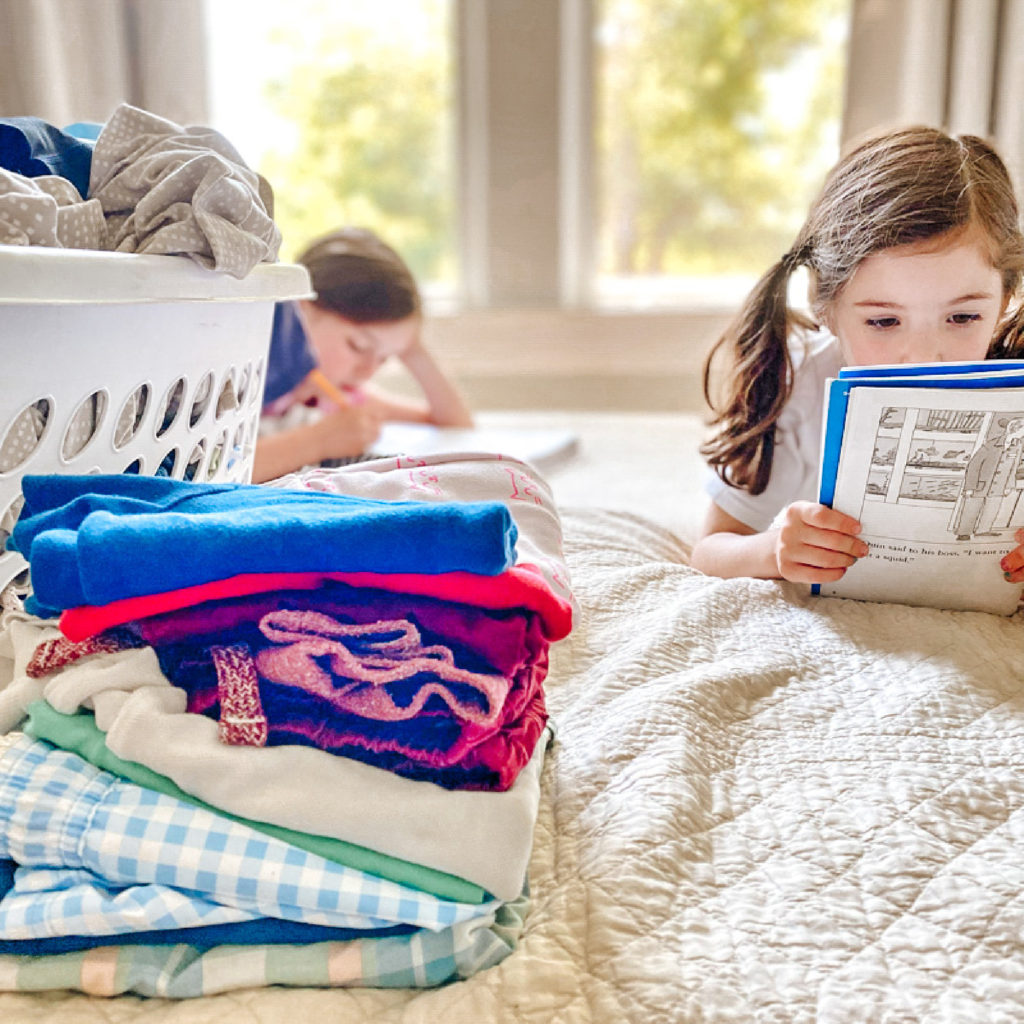This post contains affiliate links. If you follow one of my links I earn a small commission at no extra cost to you. All opinions are completely my own. Thank you for supporting my blog!
I’m so excited to introduce my friend Carla to you today! And although we have never met face to face (a serious issue I hope to remedy someday) I can genuinely call her friend. I’ve marveled at her gentle and genuine mothering style from afar via the magic of Instagram for years now. We’ve exchanged Christmas cards and messages of encouragement, and when her family received an unexpected diagnosis for their sweet boy I sent DoorDash and all the prayers I could for God’s peace. I’m confident her wisdom on homeschooling a child with unique needs will be a blessing to you! I love Carla, and I know you will too. -Kristen
Homeschooling A Child With Extra Needs
 This is a big year for our family. The journey has been a long one, full of plot twists. This is the first year I am officially teaching all three of my cute crew. Each of my children are at a different place in their education. As I planned for the year, I knew I would do as much as we could together (family style/whole group) but there were lessons that we would have to do individually. It’s important to know that our family does things a little differently.
This is a big year for our family. The journey has been a long one, full of plot twists. This is the first year I am officially teaching all three of my cute crew. Each of my children are at a different place in their education. As I planned for the year, I knew I would do as much as we could together (family style/whole group) but there were lessons that we would have to do individually. It’s important to know that our family does things a little differently.
My youngest was diagnosed with autism and type 1 diabetes within a span of two months last year. The materials we use for my typically developing daughters look different from what we use for our son. This is my first year teaching him (kindergarten) and I definitely felt the weight of his education differently. For a long time, I felt so overwhelmed at the prospect of figuring out what his learning style would be and selecting the best curriculum for him. I wanted to do so many wonderful things, after all Kindergarten is almost magical. However, those things just would not be helpful or reasonable to do with him.
Someone wise once said, “there is peace in acceptance” and it’s so very true.
Any mama caring for a child with extra needs will tell you, there is grief associated with a diagnosis. Then comes walking out the reality of what a diagnosis means. It might look like yielding the dreams or plans you had for homeschooling into the hands of God. It may mean saying no to things that most homeschool families do- co-ops, field trips, etc. It’s a tough pill to swallow and it’s one I’m still learning daily. Our homeschool doesn’t look the way I always imagined it. However, my husband and I firmly believe our God is good and His ways are always good. There is deep joy in the midst of challenge. While this isn’t what I thought it would look like, I am so very grateful to spend my days loving on and teaching my children. There is peace in acceptance. Over time and with prayer it became clear that a very gentle introduction to formal lessons was going to be our best yes for his kindergarten.
Sometimes there’s a temptation to believe that because you have a child with extra needs that homeschooling isn’t an option for you.
I wish so much that I could encourage you that you truly can be a capable teacher for your child. If the Lord has called you to homeschool, He will equip and give wisdom for what that will look like. I chose curriculum I knew wouldn’t require a ton of prep to set up and would be easy to do consistently. Even if I didn’t find it the most “rigorous” (I don’t like that word anyway) I knew that consistency with the other things we have going on would yield the result my heart is after.

Getting a new Dexcom glucose monitor!
I think one of the most powerful things in homeschool is also one of the easiest things to overlook. Consistency- faithfully showing up each day and spending that intentional learning time together is what really matters. Protect your lesson time. Choose a time of day you can consistently spend together. This is typically first thing in the morning, before other obligations begin to creep in. If nothing else, staying consistent will effectively help reach the academic goals you have set.
For our non-typically developing children we have to surrender the expectations we would hold for our typically developing children. Things will naturally look different and that’s ok.
Here are a few ideas for adapting lessons to meet your unique child’s extra needs:
Start Small
You know the frustration ceiling of your child. There’s no point in pushing a lesson beyond their engagement. You may begin your year by doing extremely small two-to-five-minute lessons. That’s ok. Day by day you can slowly add to that time frame to build stamina. (Keep in mind typical attention spans in elementary age students range between 10minutes for kindergarten and 30 minutes for 5th grade)

Using Legos to learn about the letter F.
Spark Imagination
Engaging their hearts and minds is key! My sweet guy LOVES Legos, so we incorporate them into letter activities and math lessons. You could choose a unit study based on a topic of interest. Never underestimate the power of a great read aloud. Choose a book to capture their interest and let it flow into their creativity playing and learning.
Seek Help
An occasional wonder woman roams the homeschooling realms but most of us don’t and can’t do it all on our own. When your child has extra needs, look to your community. Connect with other homeschooling mamas to ask their best practices for teaching struggling readers. Find the experienced mama who has walked through a dyslexia diagnosis. Find the curriculum guru who has researched and used just about everything out there. Reach out for an OT or speech evaluation. (Children under five in the US can have a free early intervention evaluation done through your local school district. Connect with your pediatrician to start that process.) Don’t be shy, most homeschooling mamas genuinely enjoy teaching at home and probably have some great advice from their experience.
Stay Simple
In this case, less is more. You do not have to do a whole lot to provide for their educational needs. A simple reading lesson, a basic math lesson, tie social studies/history into your read aloud, incorporate science into daily life (nature study, kitchen chemistry, etc.) You could choose a bunch of great curricula but chances are you won’t make it 4 weeks into the school year before you’re burnt out and overwhelmed. Choose something you know you can faithfully implement all year. If you find your stride and feel ready to add more later, great, and if not, you’re not feeling bad about what you’re doing because you can stay consistent with it.

Doing some “Family Orchard” dramatic play outdoors.
Step Outside
As Ginny Yurich (@1000hoursoutside) says, “not all classrooms have four walls.” Don’t be afraid to pick up and do lessons outside. There is something very powerful about sunshine and fresh air. A change of environment can help when lessons begin to feel stale. There’s a lot to be said for the learning done while playing. Social interactions and cooperative play are powerfully important.

Multitasking and taking turns doing lessons.
Switch Around
If you’re teaching multiple children, set up a plan to start with your youngest. Do one lesson together and then allow them time for a “brain break” while you meet with your next youngest, and so on until you cycle back. Prime your children by giving them a heads up when their turn is coming. “Rutledge, in 10 minutes we’re going to do our number activity.” Giving them advanced notice helps them mentally prepare for the transition to a lesson. Also, keeping consistent “brain breaks” will help them build focus stamina because they know a play break is coming soon.
Teaching multiple grades and children or meeting the needs of littles in need of extra support can feel overwhelming but I hope these ideas can encourage and inspire you. As you look to the upcoming year or pray over homeschooling keep in mind that simplicity is life-giving. You can make reasonable and sustainable plans that will result in a peaceful and enjoyable homeschool year. If the Lord has called you to homeschool, you can teach your children no matter what challenges AND delight in it too!
“He who calls you is faithful; he will surely do it.” 1 Thessalonians 5:24

About the author:
Carla is a mama with a teacher’s heart and a passion for making learning fun! Each day she finds evidence of God’s grace in the gift of motherhood and homeschooling. Inspired by a love for the little years she writes materials and resources for children from preschool through elementary ages. She has a heart to encourage mamas as they gently guide their children with intentional learning through play! As a mama to two precious girls and a sweet boy who was diagnosed with both autism and T1D, she is passionate about advocating for children with extra needs. It was the support of like minded friends and family who helped as they walked through the painful early days of diagnosis. It’s important to Carla to give back and spread the word on ways we can come beside all children, but especially those in need of extra care and support. Learn more about Carla on her blog, Everyday Learn & Play, and follow her on Instagram.
Leave a Reply